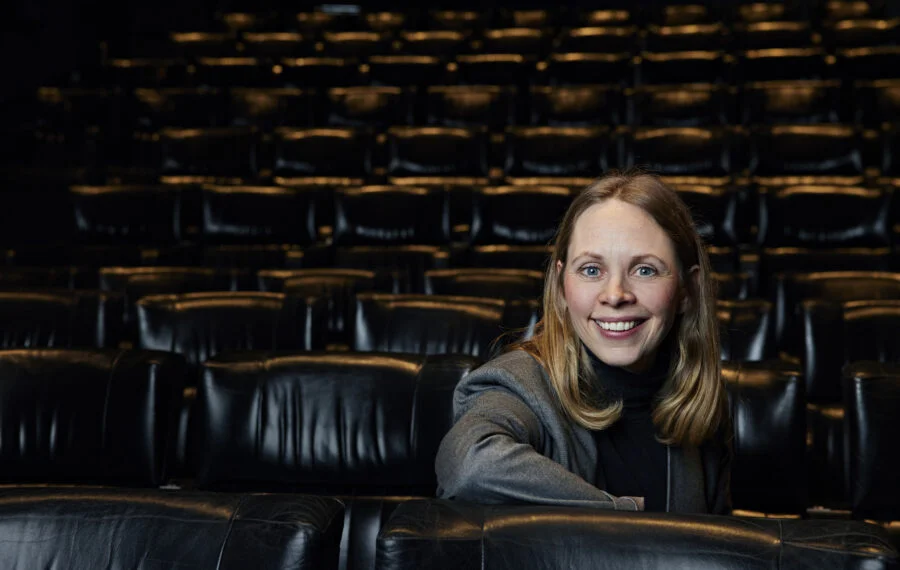
2024-04-03
“We want to be an arena to spread knowledge, inspiration and encourage conversation”
The Film Room at the Swedish Film Institute serves as a meeting place for people in the film industry. In our interview, project manager Hanna Söderstedt tells us more about her work and how film as a medium can help children and young people absorb messages, feelings and discover new things.
Hi Hanna! What is your role at the Film Institute and what is your background?
– I work as project manager for Filmrummet at the Swedish Film Institute. Filmrummet is the Swedish Film Institute’s arena for discussion and debate, and my role is to put together a seminar program, together with wise input from colleagues, with a breadth of interesting topics and people.
I have studied film, both at folk high school and university, and between 2006-2009 I attended the Program for Cultural Leaders at Växjö University. This included an internship and I ended up at the Swedish Film Institute, and that’s the way it is. I have worked at the reception, been an assistant to the CEO and project manager for the Guldbaggegala. It is really valuable to have been in many different positions at the Film Institute.
What is the purpose of the Film Room?
– Filmrummet was started in 2012 and the initiator was then head of department Tove Torbiörnsson who sensed a need among film workers to have a place for discussion and ventilation. She saw that we could offer a place, physically with a room, but also a recurring context where you get the opportunity to meet both new and old industry colleagues and meet to deepen and continue conversations about common issues. We want to be an arena for spreading knowledge and inspiration, starting and maintaining conversations.
What themes might emerge for discussion and conversation?
– As I said, we want our talks to be as broad as possible in terms of topics, focus and guests. It can be things that are happening at the Swedish Film Institute, for example if we launch new support, present new film consultants and how we work with our film heritage, but also about the progress of AI, trend forecasts and changes in film policy. It is also important that we are relevant to many, whether you work with short films, feature films or documentaries, whether you are a director, photographer or regional film consultant.
How does Filmrummet support the industry at large?
– I think you can see the Film Room as an arena where you can share knowledge, both things you know you want to know, but also things you didn’t know you wanted to know. We are also a neutral meeting place for questions that can be tricky and that need to be looked at from different angles. We’re there for everyone and we don’t take sides, which is important.
Recently, you spoke about a hot topic: children and gang crime. How can movies help children and young people talk about difficult issues and gang violence?
– As film is a medium that children and young people are used to, it can be an easier way to absorb messages, feelings and discover new things. People talk about film as an empathy machine, and I believe in that. If there is something difficult to discuss, the movie can help start a conversation or put something into words. The conversation we had at Folk och Kultur was based on the movie Bullets, which we have made a teacher’s guide for. It was great, and it was extremely interesting to hear how they had worked with the film, the guide and how the students had talked and reflected based on their experiences and approaches.
How do you see the future of Filmrummet? Any predictions for the future?
– It is exciting! We have a couple of talks booked, both this spring and in the fall, so there is plenty to do. Among other things, we will be inviting our new CEO Anna Croneman to a talk so you can get to know her a little better. But I’m keeping my eyes and ears open for what’s coming up, and I’m also looking into other types of talks and formats.
Finally, what is your dream topic to discuss in the Film Room?
– I don’t have a specific topic, but I believe in doing more knowledge-sharing conversations among colleagues and the industry, when you offer insights and knowledge. It lifts both those who share and those who listen. It’s been fun when we’ve had prominent international guests like Roger Deakins and the producer and photographer of Moonlight. Then it has been a crowded Victor bubbling with inspiration and love for the movie. It would be fun to do it again!
